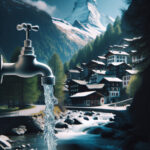-
Table of Contents
“Yerevan Tap Water: Pure, Refreshing, Straight from the Source”
Introduction

Tap water in Yerevan, the capital city of Armenia, is a significant topic due to its unique quality and accessibility. The city is known for its high-quality tap water, which is sourced from fresh mountain springs. The water undergoes rigorous treatment and testing processes to ensure it meets health and safety standards. As a result, Yerevan’s tap water is not only safe to drink but also has a pleasant taste, making it stand out among many global cities.
Understanding the Quality of Tap Water in Yerevan
The quality of tap water in any city is a critical factor that directly impacts the health and well-being of its residents. In Yerevan, the capital city of Armenia, the issue of tap water quality is of particular importance due to the city’s unique geographical location and infrastructure. This article aims to provide an in-depth understanding of the quality of tap water in Yerevan.
Yerevan, nestled in the western part of Armenia, is supplied with water from various sources, including underground wells and surface water bodies. The city’s water supply system is managed by the Yerevan Water and Sewerage Company, which is responsible for treating and distributing water to the city’s residents. The company follows stringent water quality standards set by the Armenian government, which are in line with international norms.
The primary source of Yerevan’s tap water is the underground wells located in the Ararat Valley. The water from these wells is naturally filtered through layers of soil and rock, which helps in removing impurities. However, the water still undergoes a comprehensive treatment process before it reaches the taps of Yerevan’s residents. This process includes disinfection to eliminate any harmful bacteria or viruses, and the addition of certain minerals to improve the water’s taste and nutritional value.
In addition to the underground wells, Yerevan also receives water from the Lake Sevan, one of the largest freshwater high-altitude lakes in the world. The water from Lake Sevan is treated at the Garni Water Treatment Plant, which uses advanced filtration and disinfection techniques to ensure the water’s safety and quality.
Despite these measures, there have been concerns about the quality of tap water in Yerevan. Some residents have reported issues such as an unpleasant taste or smell, and there have been instances of waterborne diseases. These issues are often attributed to the aging water infrastructure in the city, which can lead to the contamination of water during its distribution.
To address these concerns, the Yerevan Water and Sewerage Company has been undertaking various initiatives. These include the replacement of old pipes and the implementation of advanced water treatment technologies. The company also conducts regular water quality tests and makes the results publicly available, in an effort to maintain transparency and build trust with the city’s residents.
Furthermore, the Armenian government has been working with international organizations to improve the water infrastructure in Yerevan. For instance, the European Bank for Reconstruction and Development has provided funding for the modernization of the city’s water supply system.
In conclusion, while the quality of tap water in Yerevan is generally good, there are ongoing efforts to further improve it. The city’s water supply system is subject to rigorous quality control measures, and there is a strong commitment from both the local water company and the government to ensure the safety and quality of tap water. However, residents are advised to remain vigilant and report any issues with their tap water, as this can help in identifying and addressing potential problems more quickly.
Health Implications of Drinking Tap Water in Yerevan
In the bustling city of Yerevan, the capital of Armenia, tap water is a subject of considerable debate. The health implications of drinking tap water in Yerevan are multifaceted and warrant careful consideration. This article aims to provide an informative and formal discussion on the topic, shedding light on the potential risks and benefits associated with the consumption of tap water in this vibrant city.
Yerevan, like many other cities worldwide, relies heavily on its public water supply system. The city’s water supply is primarily sourced from underground wells and springs, which are naturally filtered through layers of rock and soil. This natural filtration process can effectively remove many harmful contaminants, providing a source of water that is generally safe for consumption. However, the quality of tap water can vary significantly depending on several factors, including the condition of the water supply infrastructure and the presence of environmental pollutants.
One of the primary concerns associated with drinking tap water in Yerevan is the potential presence of harmful contaminants. Despite the natural filtration process, contaminants such as heavy metals, bacteria, and viruses can still find their way into the water supply. These contaminants can pose serious health risks, including gastrointestinal illnesses, neurological disorders, and even certain types of cancer. Therefore, it is crucial for residents and visitors to be aware of these potential risks and take appropriate precautions.
On the other hand, tap water in Yerevan is regularly tested and treated to ensure its safety. The Armenian Water and Sewerage Company (AWSC), responsible for the city’s water supply, conducts regular water quality tests and employs various treatment methods to remove harmful contaminants. These methods include coagulation, sedimentation, filtration, and disinfection, which are designed to ensure that the water meets the safety standards set by the World Health Organization (WHO).
However, despite these efforts, there are still concerns about the reliability of the water treatment process. For instance, the use of chlorine for disinfection can lead to the formation of disinfection byproducts, which can also pose health risks. Moreover, the aging water supply infrastructure in Yerevan can lead to the leaching of lead and other harmful substances into the water.
In light of these concerns, many residents and visitors in Yerevan opt for bottled water or use water filters at home. While this can provide an added layer of protection, it is also important to note that bottled water and home filtration systems are not without their own potential health implications. For instance, plastic bottles can leach chemicals into the water, and improperly maintained filters can become a breeding ground for bacteria.
In conclusion, the health implications of drinking tap water in Yerevan are complex and multifaceted. While the city’s water supply is generally safe for consumption, potential risks associated with contaminants and the water treatment process cannot be overlooked. Therefore, it is crucial for individuals to stay informed about the quality of their water supply and take appropriate precautions to protect their health. Whether this means relying on bottled water, using a home filtration system, or advocating for improvements in the city’s water supply infrastructure, the choice ultimately lies with the individual.
The Role of Government in Ensuring Safe Tap Water in Yerevan
The role of the government in ensuring safe tap water in Yerevan, the capital city of Armenia, is a topic of paramount importance. The city, home to over a million people, relies heavily on tap water for daily consumption and household chores. Therefore, the government’s responsibility in maintaining the quality of this essential resource cannot be overstated.
The government, through the Ministry of Health and the State Committee on Water Economy, plays a pivotal role in ensuring the safety and quality of tap water in Yerevan. The Ministry of Health is primarily responsible for setting the standards for water quality, while the State Committee on Water Economy oversees the implementation of these standards.
The government’s role begins with the establishment of stringent water quality standards. These standards are based on scientific research and are designed to ensure that the tap water is free from harmful substances such as bacteria, viruses, and chemical contaminants. The standards also stipulate the acceptable levels of minerals and other substances that are naturally present in water.
Once the standards are set, the government, through the State Committee on Water Economy, ensures their implementation. This involves regular monitoring and testing of the water supply to ensure compliance with the standards. The committee also oversees the operation and maintenance of the water supply infrastructure, including the treatment plants, pipelines, and distribution networks.
In addition to monitoring and testing, the government also plays a crucial role in educating the public about the importance of water quality. This includes providing information on the standards and how they are maintained, as well as advice on how to use and conserve water responsibly. The government also encourages public participation in water management through various initiatives and programs.
However, ensuring safe tap water in Yerevan is not without challenges. The city’s water supply infrastructure is aging and in need of significant upgrades. Moreover, the city’s rapid urbanization and population growth are putting increasing pressure on the water resources. The government is therefore faced with the task of balancing the need for development with the need to protect and conserve the water resources.
To address these challenges, the government has embarked on a number of initiatives. These include investing in the modernization of the water supply infrastructure, implementing water conservation measures, and promoting the use of sustainable water management practices. The government is also working closely with international partners and organizations to access technical expertise and funding for these initiatives.
In conclusion, the government plays a crucial role in ensuring safe tap water in Yerevan. This involves setting and enforcing water quality standards, monitoring and testing the water supply, and educating the public about water quality and conservation. Despite the challenges, the government is committed to ensuring that the residents of Yerevan have access to safe and clean tap water. This commitment is reflected in the ongoing efforts to modernize the water supply infrastructure and promote sustainable water management practices.
Comparative Analysis: Tap Water in Yerevan vs. Bottled Water
In the bustling city of Yerevan, the capital of Armenia, the debate between the consumption of tap water and bottled water is a topic of considerable interest. This comparative analysis aims to shed light on the quality, safety, and environmental impact of both sources of water, providing an informative perspective on this critical issue.
Yerevan, known for its rich history and vibrant culture, is also recognized for its high-quality tap water. The city’s water supply is primarily sourced from underground springs, which are naturally filtered through layers of rock and soil, reducing the need for chemical treatment. The water is then further treated and tested rigorously to ensure it meets the stringent safety standards set by the Armenian government. This process ensures that the tap water in Yerevan is not only safe to drink but also retains essential minerals beneficial to human health.
On the other hand, bottled water, often perceived as a safer and more convenient option, has its own set of considerations. While it is true that bottled water undergoes a purification process, it is important to note that the standards for bottled water are not necessarily stricter than those for tap water. In fact, in some cases, bottled water is simply tap water that has been further treated and packaged. Moreover, the safety of bottled water can be compromised by the plastic bottles themselves, which may leach harmful chemicals into the water, especially when exposed to heat.
From an economic perspective, tap water in Yerevan is significantly more cost-effective than bottled water. The average cost of tap water in the city is a fraction of the price of bottled water, making it a more affordable option for the majority of residents. This cost difference becomes even more pronounced when considering the long-term consumption of water.
The environmental impact of the two sources of water also presents a stark contrast. The production and disposal of plastic bottles contribute significantly to environmental pollution and resource depletion. In contrast, the consumption of tap water, especially when paired with reusable water containers, has a much lower environmental footprint. Yerevan’s tap water system, with its reliance on local water sources and minimal treatment processes, also uses less energy compared to the production and distribution of bottled water.
However, it is important to acknowledge that the preference for bottled water in Yerevan, as in many other places, is often driven by concerns about the reliability and safety of tap water. While the city’s water supply system is generally reliable, occasional disruptions and variations in water quality can occur. In such instances, bottled water serves as a valuable alternative.
In conclusion, while both tap water and bottled water in Yerevan have their respective merits, the choice between the two is not clear-cut. It depends on a variety of factors, including personal preferences, health considerations, economic circumstances, and environmental awareness. Nevertheless, it is evident that Yerevan’s tap water, with its high quality, affordability, and lower environmental impact, presents a compelling case for consideration. As consumers, it is crucial to stay informed and make water consumption choices that are not only beneficial to our health but also sustainable for our environment.
Q&A
1. Question: Is tap water in Yerevan safe to drink?
Answer: Yes, the tap water in Yerevan is generally considered safe to drink as it comes from pure mountain springs.
2. Question: What is the source of Yerevan’s tap water?
Answer: Yerevan’s tap water comes from high-quality underground sources and mountain springs.
3. Question: Does the tap water in Yerevan need to be boiled before drinking?
Answer: No, it is not necessary to boil the tap water in Yerevan before drinking as it is already treated and safe for consumption.
4. Question: Is the taste of tap water in Yerevan good?
Answer: The taste of tap water can be subjective and vary from person to person. However, many locals and tourists find the tap water in Yerevan to be clean and refreshing.
Conclusion
In conclusion, the tap water in Yerevan is generally considered safe to drink. It meets the health and safety standards set by the World Health Organization. However, the taste and quality can vary depending on the specific location within the city. Some residents and visitors may prefer to use a water filter or consume bottled water.






